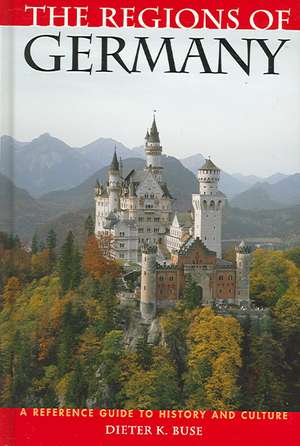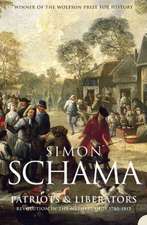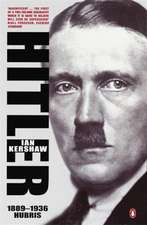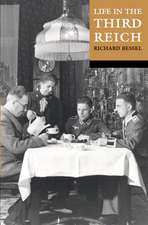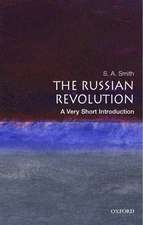The Regions of Germany: A Reference Guide to History and Culture
Autor Dieter K. Buseen Limba Engleză Hardback – 29 iun 2005 – vârsta până la 17 ani
Preț: 276.78 lei
Preț vechi: 567.40 lei
-51% Nou
Puncte Express: 415
Preț estimativ în valută:
52.97€ • 55.18$ • 44.04£
52.97€ • 55.18$ • 44.04£
Carte tipărită la comandă
Livrare economică 10-24 februarie 25
Preluare comenzi: 021 569.72.76
Specificații
ISBN-13: 9780313324000
ISBN-10: 031332400X
Pagini: 312
Dimensiuni: 156 x 235 x 27 mm
Greutate: 0.61 kg
Editura: Bloomsbury Publishing
Colecția Greenwood
Locul publicării:New York, United States
ISBN-10: 031332400X
Pagini: 312
Dimensiuni: 156 x 235 x 27 mm
Greutate: 0.61 kg
Editura: Bloomsbury Publishing
Colecția Greenwood
Locul publicării:New York, United States
Notă biografică
Dieter K. Buse is Professor of History at Laurentian University, Sudbury, Ontario, and the coauthor of Modern Germany: An Encyclopedia of History, People and Cultures, 1871-1990 (1998), among other works.
Cuprins
PrefaceIntroduction: Why Germany's Regions MatterBaden-WürttembergBavariaBerlinBrandenburgBremenHamburgHesseLower SaxonyMecklenburg-Western PomeraniaNorth Rhine WestphaliaRhineland PalatinateSaarlandSaxonySaxony-AnhaltSchleswig-HolsteinThuringiaGlossaryChronologySelected BibliographyIndex
Recenzii
Landeskunde, a German word for regional studies, connotes an area's geography, history, customs, and cuisine-among other aspects-and accurately describes the subject matter of this unique reference guide..[t]his work will be useful to travelers, students, and others who want to learn basic information about this widely varied country..[a]n informative and useful source for general readers. Recommended for public and secondary school libraries.
This book was clearly a labor of love for accomplished German historian Dieter Buse. Academically active for the last forty years, the author has produced a basic reference work covering the Federal Republic's current Lander that seeks to show the reader how a focus on regions enables us to understand the reconstruction of German identity after WWII. Buse argues that after the catastrophe of the Second World War, most Germans rehabilitated themselves from the local level outward. While the focus on Heimat is not new, the book is well organized, factually accurate, and easily accessible to a variety of audiences, from academics to those planning a trip to central Europe.
Dieter K. Buse..has combined his extensive historical knowledge and wide-ranging travel experience in Germany to construct a work that is easy to use, interesting to read, and useful to anyone seeking a brief introduction to the history and culture of Germany's various regions..Buse recognizes that the history and character of Germany's regions do not fit neatly within the country's current political map. By making this clear in his regional histories..he is able to use Germany's current configuration of states to construct chapters that stand on their own..The potential traveller interested in the region's landscape and cultural life would gain much from the succinct, but thorough, guide to main attractions..[a] very useful resource on the regions of Germany. It can be used as the starting point for those interested in the history of the country's various states as well as a guide for those interested in visiting the country.
[A]n excellent guide to the contemporary German Lander in their geographical, historical, cultural and political context. For each region information is provided on dialect, natural geography, cities, history, economy, 'attractions', cultural attributes and contributions (including visual arts, literature, music, customs and festivals, leisure and sports, civics and remembrance, and cuisine)..Buse has written a guide that all students should read before making a trip to Germany. It will also be an excellent source for teaching preparation and for project work. Indeed, he has produced the kind of guide one always hopes for when buying volumes from the established travel guide series, where expectations are routinely disappointed by sloppy research and a poor grasp of history. Buse's book, by contrast, can be recommended without reservation. It must have been great fun to research and write as well!
[A]n appealing and interesting book on the regional varieties of Germany.
As the title suggests, this delightful book is a fine reference guide to the history and culture of the regions of Germany. Its intent is to bridge the gap between general reference works and those dealing with specialized academic topics. The Regions of Germany has been a labor of love for author Dieter Buse, who has spent the past 30 years working in the field of German history, and students of German and Germany will enjoy this wonderful addition to the field..There is just so much the author and editors can put into a reference guide, and The Regions of Germany is the first book I will tell others to consult as they seek to learn about Germany. Dieter Buse has provided a valuable resource for those studying German and Germany. This easy-to-use reference will be of interest to scholars, teachers, and travelers alike.
This reference for students, teachers, and general readers provides an overview of the 16 states that make up the reunified Germany. Buse discusses regional diversity and summarizes the results of German reunification in the introduction. Essential data in such areas as demographics, geography, history, recent politics, economy, architecture, culture, and traditional cuisine are then presented for each state. Supplementary materials include recipes, a glossary, a chronology, maps, and photos.
Any college-level collection strong on European studies will want to have Dieter K. Buse's reference The Regions of Germany: A Reference Guide to the History and Culture at hand: it provides an overview of the 16 federal states which make up the reunified Germany, offering details on not just geography and history, but recent political, social, and economic changes. In having both the history of each state and the current issues under one cover, any studying modern Germany receive a well-rounded overview complete with maps, photos, and timelines.
Part travel guide, part reference work, part cookbook, and part hodge-podge, the book is ideal for its intended man-on-the-street audience.
This book was clearly a labor of love for accomplished German historian Dieter Buse. Academically active for the last forty years, the author has produced a basic reference work covering the Federal Republic's current Lander that seeks to show the reader how a focus on regions enables us to understand the reconstruction of German identity after WWII. Buse argues that after the catastrophe of the Second World War, most Germans rehabilitated themselves from the local level outward. While the focus on Heimat is not new, the book is well organized, factually accurate, and easily accessible to a variety of audiences, from academics to those planning a trip to central Europe.
Dieter K. Buse..has combined his extensive historical knowledge and wide-ranging travel experience in Germany to construct a work that is easy to use, interesting to read, and useful to anyone seeking a brief introduction to the history and culture of Germany's various regions..Buse recognizes that the history and character of Germany's regions do not fit neatly within the country's current political map. By making this clear in his regional histories..he is able to use Germany's current configuration of states to construct chapters that stand on their own..The potential traveller interested in the region's landscape and cultural life would gain much from the succinct, but thorough, guide to main attractions..[a] very useful resource on the regions of Germany. It can be used as the starting point for those interested in the history of the country's various states as well as a guide for those interested in visiting the country.
[A]n excellent guide to the contemporary German Lander in their geographical, historical, cultural and political context. For each region information is provided on dialect, natural geography, cities, history, economy, 'attractions', cultural attributes and contributions (including visual arts, literature, music, customs and festivals, leisure and sports, civics and remembrance, and cuisine)..Buse has written a guide that all students should read before making a trip to Germany. It will also be an excellent source for teaching preparation and for project work. Indeed, he has produced the kind of guide one always hopes for when buying volumes from the established travel guide series, where expectations are routinely disappointed by sloppy research and a poor grasp of history. Buse's book, by contrast, can be recommended without reservation. It must have been great fun to research and write as well!
[A]n appealing and interesting book on the regional varieties of Germany.
As the title suggests, this delightful book is a fine reference guide to the history and culture of the regions of Germany. Its intent is to bridge the gap between general reference works and those dealing with specialized academic topics. The Regions of Germany has been a labor of love for author Dieter Buse, who has spent the past 30 years working in the field of German history, and students of German and Germany will enjoy this wonderful addition to the field..There is just so much the author and editors can put into a reference guide, and The Regions of Germany is the first book I will tell others to consult as they seek to learn about Germany. Dieter Buse has provided a valuable resource for those studying German and Germany. This easy-to-use reference will be of interest to scholars, teachers, and travelers alike.
This reference for students, teachers, and general readers provides an overview of the 16 states that make up the reunified Germany. Buse discusses regional diversity and summarizes the results of German reunification in the introduction. Essential data in such areas as demographics, geography, history, recent politics, economy, architecture, culture, and traditional cuisine are then presented for each state. Supplementary materials include recipes, a glossary, a chronology, maps, and photos.
Any college-level collection strong on European studies will want to have Dieter K. Buse's reference The Regions of Germany: A Reference Guide to the History and Culture at hand: it provides an overview of the 16 federal states which make up the reunified Germany, offering details on not just geography and history, but recent political, social, and economic changes. In having both the history of each state and the current issues under one cover, any studying modern Germany receive a well-rounded overview complete with maps, photos, and timelines.
Part travel guide, part reference work, part cookbook, and part hodge-podge, the book is ideal for its intended man-on-the-street audience.
